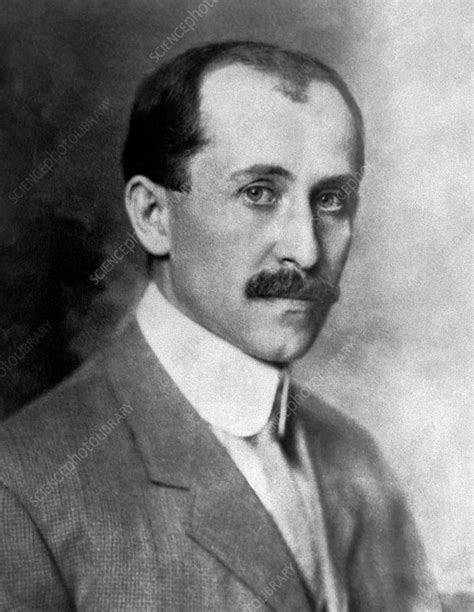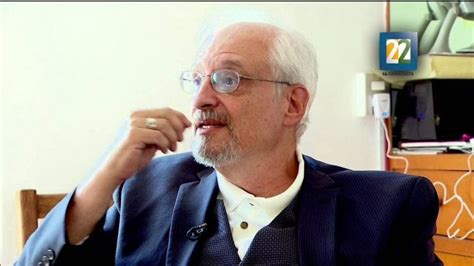Top 754 Interaction Quotes & Sayings - Page 13
Explore popular Interaction quotes.
Last updated on April 22, 2025.
If I ever treated being gay as a problem, then I'm going to continuously find problems, I'm never going to find solutions. Students consistently ask about my personal life, and I kindly let them know, "That's my personal life, you don't need to know that." I've never had a negative interaction with students or parents. I try to become a part of the community so that parents can feel as comfortable with their child moving along in the curriculum more so than me being a problem.
If our well-being depends upon the interaction between events in our brains and events in the world, and there are better and worse ways to secure it, then some cultures will tend to produce lives that are more worth living than others; some political persuasions will be more enlightened than others; and some world views will be mistaken in ways that cause needless human misery.
Consider prejudice. Once a person begins to accept a stereotype of a particular group, that "thought" becomes an active agent, "participating" in shaping how he or she interacts with another person who falls in that stereotyped class. In turn, the tone of their interaction influences the other person's behaviour. The prejudiced person can't see how his prejudice shapes what he "sees" and how he acts. In some sense, if he did, he would no longer be prejudiced. To operate, the "thought" of prejudice must remain hidden to its holder
Single cells analyze thousands of stimuli from the microenvironment they inhabit. The more awareness an organism has of its environment, the better its chances for survival. When cells band together they increase their awareness exponentially. Division of labor among the cells in the community offers an additional survival advantage. The efficiency it enables more cells to live on less. Evolution is based on an instructive, cooperative interaction among organisms and their environment enables life forms to survive and evolve in a dynamic world.
So you think the best way to prepare kids for the real world is to bus them to a government institution where they're forced to spend all day isolated with children of their own age and adults who are paid to be with them, placed in classes that are too big to allow more than a few minutes of personal interaction with the teacher-then spend probably an hour or more everyday waiting in lunch lines, car lines, bathroom lines, recess lines, classroom lines, and are forced to progress at the speed of the slowest child in class?
There was only really one time that I had a substantive interaction with the president [Barak Obama] directly, and that was in 2013 when we were deciding whether to file a brief in the first gay marriage case, the Perry against Hollingsworth case. That was a weighty decision about whether the United States government was going to come in and say that heightened scrutiny ought to apply and some state bans on same-sex marriage ought to be unconstitutional. And that was the one time in my tenure where I thought I ought not make this decision without talking to the president.
Switch to piano! No. Really, if you like an instrument that sings, play the saxophone. At its best it's like the human voice. Of course, it would be best if you could actually sing with your own voice. The saxophone is an imperfect instrument, especially the tenor and soprano, as far as intonation goes. Therefore, the challenge is to sing on an imperfect instrument or 'voice' that is outside of your body. I love that challenge and have for over forty-five years. As far as playing jazz, no other art form, other than conversation, can give the satisfaction of spontaneous interaction.
No Geologist worth anything is permanently bound to a desk or laboratory, but the charming notion that true science can only be based on unbiased observation of nature in the raw is mythology. Creative work, in geology and anywhere else, is interaction and synthesis: half-baked ideas from a bar room, rocks in the field, chains of thought from lonely walks, numbers squeezed from rocks in a laboratory, numbers from a calculator riveted to a desk, fancy equipment usually malfunctioning on expensive ships, cheap equipment in the human cranium, arguments before a road cut.
Computer and video games represent one of the most important new media developments of this generation. Unlike many other forms of entertainment they offer players the opportunity to explore, be creative, learn through interaction and express themselves to others. It is vitally important that we protect and nurture this new art form so that it can reach its full potential. Like most new forms of artistic expression that have come before (music, novels, movies), the primary critics of video games are the people that do not play them.
Ugh, puppy mills. These commercial breeding facilities are horrendous. The animals are kept in tiny wire cages, with little to no human interaction throughout their lives. They are rarely, if ever, seen medically and are forced to breed over and over again and watch as their babies are taken away from them and sold to pet stores. It is a supply-and-demand business, so the more people stop going to pet stores and choose to adopt instead, the quicker we can put an end to these puppy mills.
Quantum theory thus reveals a basic oneness of the universe. It shows that we cannot decompose the world into independently existing smallest units. As we penetrate into matter, nature does not show us any isolated "building blocks," but rather appears as a complicated web of relations between the various parts of the whole. These relations always include the observer in an essential way. The human observer constitute the final link in the chain of observational processes, and the properties of any atomic object can be understood only in terms of the object's interaction with the observer.
I would suggest two approaches to begin the leadership journey in earnest. First would be to ask oneself, in every interaction with others over the course of a single day: How can you best serve this person? Another approach would be to attempt, over the course of a single day, to reframe your declarative statements into questions. The thoughtful use of questions can be transformational. In my experience, most people find these exercises more challenging - and more rewarding - than they would have imagined.
Then there is another area of activity - economic interaction between Russia and the United States. Right now, for example, it has already been made public that we signed a large deal to privatise one of our biggest oil and gas companies, Rosneft. We know for sure that US companies, as well as Japanese ones, by the way, are keenly interested in cooperation in Russia's oil and gas sector, in joint work. This has immense significance for world energy markets and will directly affect the whole world economy.
Central to Jungian psychology is the concept of "individuation," the process whereby a person discovers and evolves his Self, as opposed to his ego. The ego is a persona, a mask created and demanded by everyday social interaction, and, as such, it constitutes the center of our conscious life, our understanding of ourselves through the eyes of others. The Self, on the other hand, is our true center, our awareness of ourselves without outside interference, and it is developed by bringing the conscious and unconscious parts of our minds into harmony.
The upholder of the cycles which sustain all Life is water. In every drop of water dwells a deity whom indeed we all serve. There also dwells Life, the soul of the primal substance - water - whose boundaries and banks are the capillaries that guide it, and in which it circulates. Every pulse beat arising through the interaction of will and resistance is indicative of creative work and urges us to care for those vessels, those primary and most vital structures, in which throbs the product of a dualistic power - Life
Leadership is the name that people use to make sense out of complex events and the outcomes of events they otherwise would not be able to explain. In other words, people attribute leadership to certain individuals who are called leaders because people want to believe that leaders cause things to happen rather than have to explain causality by understanding complex social forces or analyzing the dynamic interaction among people, events, and environment.
When carbon (C), Oxygen (o) and hydrogen (H) atoms bond in a certain way to form sugar, the resulting compound has a sweet taste. The sweetness resides neither in the C, nor in the O, nor in the H; it resides in the pattern that emerges from their interaction. It is an emergent property. Moreover, strictly speaking, is not a property of the chemical bonds. It is a sensory experience that arises when the sugar molecules interact with the chemistry of our taste buds, which in turns causes a set of neurons to fire in a certain way. The experience of sweetness emerges from that neural activity.
[T]here are, at bottom, basically two ways to order social affairs, Coercively, through the mechanisms of the state - what we can call political society. And voluntarily, through the private interaction of individuals and associations - what we can call civil society. ... In a civil society, you make the decision. In a political society, someone else does. ... Civil society is based on reason, eloquence, and persuasion, which is to say voluntarism. Political society, on the other hand, is based on force.
Gideon laughed. "I like to be direct." "Okay," I said. "But I warn you, I like to be evasive, inserutable and generally send mixed messages." "I doubt it." "Human interaction is not my strong point," I told him. "Not seriously." "Seriously," I said. Thinking: There is so much about me he doesn't know. Gideon put his hand on my leg. "What's your strong point, then?" "Goats," I told him. "I am excellent with goats.
I am starting to get tired of relying on words. They are full of meaning, yes, but they lack sensation. Writing to her is not the same as seeing her face as she listens. hearing back from her is not the same as hearing her voice. I have always been grateful for technology, but now it feels as if there's a little hitch of separation woven into any digital interaction. I want to be there, and this scares me. All my usual disconnected comforts are bieng taken away, now that I see the greater comfort of presence.
We search out the most perfect pieces of rock. It's so amazing that these formations are so perfect for climbing on. It's almost as if they were created for climbing. You're taking these random rock formations and you're bringing to it this interaction. It transforms it from being this random rock into almost this piece of art. It's almost like a sculpture or something. Just by finding the handholds, finding that line up the rock. Every climb is different, has its own unique set of movements and body positions. Climbing and my appreciation for nature are totally intertwined.
For just as some people want a purely spiritual Christ, without flesh and without the cross, they also want their interpersonal relationships provided by sophisticated equipment, by screens and systems which can be turned on and off on command. Meanwhile, the Gospel tells us constantly to run the risk of a face-to-face encounter with others, with their physical presence which challenges us, with their pain and their pleas, with their joy which infects us in our close and continuous interaction.
I think that there is a middle-class desire, and maybe an almost universal desire, among many human beings to live in clean neighborhoods, among people like themselves, around people with whom they feel comfortable. That can be exclusive, it could be exclusionary. It could be racist, classist, genocidal, and so on. Most people like comfort. Now what provides a sense of comfort varies. I do think that people who like living in cities like small-scale human interaction and they like the social dimensions of aesthetic diversity that Jane Jacobs wrote about.
It is probably true quite generally that in the history of human thinking the most fruitful developments frequently take place at those points where two different lines of thought meet. These lines may have their roots in quite different parts of human nature, in different times or different cultural environments or different religious traditions: hence if they actually meet, that is, if they are at least so much related to each other that a real interaction can take place, then one may hope that new and interesting developments may follow.
Of course, to avoid getting stuck in that convo with someone you dislike or feel uncomfortable around, don't be passive, be proactive. Do not let them direct your interaction on their terms, do it on yours. Ask a Misdirection Question--something too difficult to answer quickly--e.g., 'What's Congress up to?' or 'You ever learn any cool science?' When you ask the question, don't make eye contact, keep moving and get out of there. Do not wait for a response and deny ever asking it. Repeat these actions until you are never again spoken to by that individual (about four times).
When we talk about magic a lot of people think you use that to pick up girls. So therefore there's this slimy connotation associated with it, like, "Oh hey, pick a card - my number's on it!" So I think I've avoided ever having people think that's what's happening. I try to make magic the treat of the interaction or the treat of the flirt. I've never gone up and tried to do a trick to get a girl's number, only because I feel like that's what people expect and it feels slimy.
No matter the organization, the goal, or the mission, you've got to do it through people. It's been that way for me since my first command. I work to understand the people, their views and needs, and how tasks are being carried out.That interaction might cause me to modify my guidance or the way I delegate. It also affords me an opportunity to learn what goals people have and how as their boss I can facilitate their future in ways that not only help them, but also help the ship or the organization.
The thing of being able to share somebody's reality, which has so far been a matter of what communication is about, you know. Now it has gotten a whole new leg. It has gotten a thing of being able to actually step in somebody's reality and walk through it like they do, experience it the way they do, specifically. The implications, to me, are immense. I mean, how far can it go? If you go into a complete, like a cyberspace model of some type, in which... you know the discussion about the mind and the interaction between the mind and the universe as a holographic phenomenon.
My first interaction with William Shakespeare was an American production and there was an actress, playing Puck, who sounded like Mickey Mouse. When she said, I'll put a girdle around the earth in 40 minutes," I was amazed - the idea of Puck traveling around the Earth in 40 minutes was amazing to me. My dad, who was a scientist, I remember him telling me that Sputnik circled the globe in an hour in a half. And I thought, "Wow, Puck is twice as fast as Sputnik."
I think the most important key to quality communication and interaction is developing an interest in the person you`re talking with. Most women know the secret to a quality conversation is to ask quality questions and have a sincere interest in hearing the answers. In fact, the best communicators very often say the least. It`s not the extrovert who dominates the conversation that a client feels most connected with, but rather the individual who shows a real and sincere interest in knowing about the life of the person they`re talking with.
A single raised eyebrow. "You've defected, sweetheart. No use worrying about the big, bad wolf now." She was aware of Judd speaking, but her attention never shifted off the man who was a predator, for all that he wore human skin. When he peeled open and held out a bar of some kind, she took it, aware low energy levels could be dangerous when it came to her ability to keep a handle on the cold fire. "Thank you." A faint smile, a strange amusement in those icy eyes. "You're welcome." It was the most polite interaction they'd ever had.
There are various causes for the generation of force: a tensed spring, an air current, a falling mass of water, fire burning under a boiler, a metal that dissolves in an acid-one and the same effect can be produced by means of all these various causes. But in the animal body we recognise only one cause as the ultimate cause of all generation of force, and that is the reciprocal interaction exerted on one another by the constituents of the food and the oxygen of the air. The only known and ultimate cause of the vital activity in the animal as well as in the plant is a chemical process.
Loneliness is a hard thing to handle. I feel it, sometimes. When I do, I want it to end. Sometimes, when you're near someone, when you touch them on some level that is deeper than the uselessly structured formality of casual civilized interaction, there's a sense of satisfaction in it. Or at least, there is for me. It doesn't have to be someone particularly nice. You don't have to like them. You don't even have to want to work with them. You might even want to punch them in the nose. Sometimes just making that connection is its own experience, its own reward.
That night we made love "the real way" which we had not yet attempted although married six months. Big mystery. No one knew where to put their leg and to this day I'm not sure we got it right. He seemed happy. You're like Venice he said beautifully. Early next day I wrote a short talk ("On Defloration") which he stole and had published in a small quarterly magazine. Overall this was a characteristic interaction between us. Or should I say ideal. Neither of us had ever seen Venice.
































